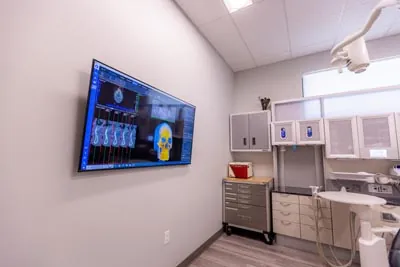Welcome to Pine Hills Dentistry, where we prioritize your oral health and overall well-being. If you’re experiencing jaw pain, discomfort, or difficulty in jaw movement, you might be facing temporomandibular joint (TMJ) disorder.
At Pine Hills Dentistry, our skilled dental team provides patients with relief with top TMJ disorder treatments in Grass Valley, CA and beyond.
What is the TMJ?

What are Common Symptoms of TMJ Disorders?
Symptoms of TMJ disorder can vary by patient, but may include:
- Jaw pain. Persistent pain in or around the ear is a common symptom of TMJ disorders.
- Jaw clicking or popping sounds. You may notice clicking, popping, or grating sounds when you open or close your mouth.
- Jaw movement dysfunction. TMJ disorders can result in limited jaw movement or locking, making it challenging to open or close your mouth fully.
- Headaches and facial pain. Chronic headaches or facial pain, often radiating around the jaw area, can be indicative of TMJ issues.
What Causes TMJ Disorders?
Common causes of Temporomandibular Joint Disorder include:
- Bruxism (teeth grinding). Grinding or clenching your teeth, especially during sleep, can contribute to TMJ problems.
- Arthritis. Inflammation of the TMJ due to arthritis can lead to pain and discomfort.
- Bite dysfunction. Sometimes our patients can have an unnatural bite that causes premature contact points when chewing, biting, sleeping, or even speaking.
- Stress. High levels of stress can cause muscle tension and contribute to TMJ disorders. In our experience at Pine Hills Dentistry, stress is a leading cause of most TMJ disorders.
Treatment Options for TMJ Disorders
Our dentists in Grass Valley, CA offer a selection of treatments for TMJ Disorder, including:
- Lifestyle modifications. Simple lifestyle changes, such as avoiding hard or chewy foods and practicing stress-reducing techniques, can alleviate TMJ symptoms.
- Oral appliances. Custom-fitted oral appliances, such as splints or mouth guards, can help prevent teeth grinding and reduce pressure on the TMJ.
- Physical therapy. Specific exercises and physical therapy can strengthen jaw muscles and improve joint function.
- Medication. Pain relievers, muscle relaxants, and anti-inflammatory medications may be prescribed to manage pain and inflammation.
- Injections. Corticosteroid injections directly into the joint can provide relief from inflammation and pain.
- Oral surgery. In severe cases of TMJ disorder, surgical intervention may be considered, such as arthroscopy or joint replacement. Surgical intervention is rarely used for the majority of TMJ cases.
Why Choose Pine Hills Dentistry for TMJ Care?

Get the TMJ Relief You Need
If you’re experiencing symptoms of TMJ disorders or have concerns about your jaw health, schedule a consultation with us. Together, we can explore the best course of action to restore comfort and functionality to your jaw.